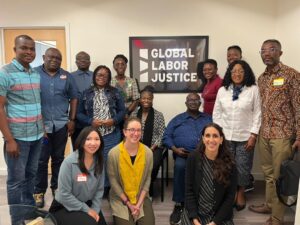Mahatma Gandhi, the eminent Indian independence activist and leader, once said “No culture can live if it attempts to be exclusive.” This statement underscores the imperative for cultures to embrace diversity and promote unity.
In other words, a culture cannot thrive or be sustainable if it isolates itself from other cultures and refuses to interact, share, or integrate with them. Culture cuts across various segments of society. There is education culture, work culture, food culture, health culture, and many more.
Purposefully creating, nurturing, and sustaining an atmosphere of cultural diversity not only ensures the survival of a culture but also nourishes it and facilitates the sharing of ideas, knowledge, and skills.
The eventual outcome is enhanced creativity and innovation when it comes to solving problems. This is particularly crucial for educational cultures in today’s technologically-connected society, as they unquestionably shape minds and transform lives.

In consonance with the preceding statement, Senator James William Fulbright of the United States stated that “Educational exchange turns nations into people and makes significant contributions, unlike any other form of communication, to humanizing international relations”. He believed in diversity and global knowledge; therefore, he initiated the international exchange programme for scholars called the Fulbright Scholarship.
Back home, listening to and observing the educational landscape from afar, with a particular focus on law schools, one cannot help but admire the University of Ghana School of Law (UGSoL). Over the years, it has tenaciously worked to create a culture of innovation, inclusivity, and diversity, dumping mediocrity in the process.

It has introduced 19 twin Master of Laws (LLM) and Master of Arts (MA) programmes tailored to meet Ghana’s needs in the twenty-first century, with a global appeal to equip students with the knowledge and skills needed to navigate modern-day work-related legal and regulatory challenges. Most importantly, it ensures that all students receive fair treatment and equal opportunities, including the international exposure component of UGSoL’s legal education.
It was both intriguing and refreshing when the Dean of UGSoL, Prof. Raymond A. Atuguba, announced on Joy FM’s morning show about three weeks ago that graduate students, including the first cohort, who had unfortunately missed out on the international component of their legal education, had been given that opportunity and were receiving international legal training in selected law schools in Europe and America.
The media interview revealed that the first cohort had a special dispensation. Indeed, checks indicate that between March and April, a team completed a study tour of the Institute of Austrian and International Tax Law in Vienna, Austria; Columbia Law School in New York, USA and the University of Passau Faculty of Law in Germany. The team included students from the first cohort.
Another team completed a study tour of the Columbia Law School in New York, USA; the University of Pennsylvania Centre for Global Health in Philadelphia, USA and the Global Justice-International Labour Rights Forum in Washington DC, USA in early June. Other students will complete their study tour of the Harvard Law School in Massachusetts, USA; the Columbia Law School in New York, USA and the University of Stirling Law School in Scotland, United Kingdom, at the end of June.
Meanwhile, other students are lacing their boots for a study tour in July and August of the School of Oriental and African Studies (SOAS) School of Law in London, United Kingdom; the University of South Carolina in the USA and the Tulane University Maritime Law Centre in New Orleans, USA.

It was also encouraging to note that the undergraduate students are equally participating in a semester exchange programme at the University of Gdańsk in Poland and the Paris Lodron University of Salzburg (PLUS) in Austria, sponsored by the Erasmus + Programme. It focuses on enhancing their legal knowledge through lectures and networking sessions. Not only do these undergraduate students consistently demonstrate dedication and stellar performances throughout such exchange programmes, but UGSoL’s international network grows by the day to offer such opportunities to students.
Prof. Atuguba noted that “at the University of Ghana School of Law, we give every student the opportunity to get international experience, including traveling abroad to the best universities in the world to study for a period of time and to come back.”
Verily, St. Augustine could not have put it in a better way when he said, “The world is a book, and those who do not travel read only a page.” Similarly, the Prime Minister of India, Narendra Modi, emphasised that “whatever education a university or institute of higher education imparts, it must achieve the global level of benchmarking given the vastness and diversity of the global village we live in today.”
These endeavours by the UGSoL to ensure thoroughbred legal minds are commendable. They represent a deliberate effort to sustainably enrich and empower Ghana’s legal fraternity with quality human resources that are versatile in international approaches, interventions and globally acknowledged best practices to ensure a fair and just society for all. They will serve as leading lights in the legal profession well beyond the shores of Ghana.
The University of Ghana School of Law is arguably Ghana’s premier law school, which is much sought-after and has a clear competitive edge. The recent international exposure to the study of law at UGSoL will further entrench the School’s position as a destination of choice for legal education.
As mentioned during the interview on Joy FM’s morning show, UGSoL is constantly innovating to stay ahead of the competition and does not compromise on quality. That is the way to go in order to remain one of Africa’s top five law schools and the best in West Africa. The achievements of UGSoL are obvious, and expectations can only be high.










